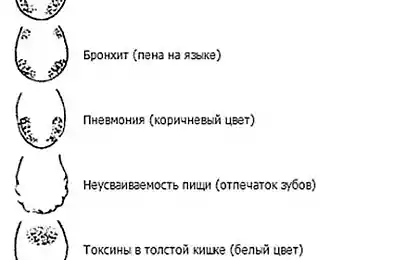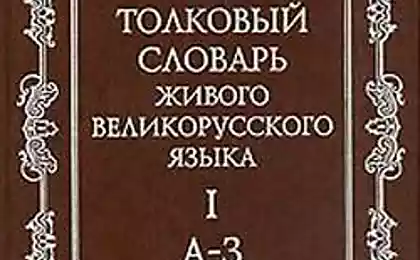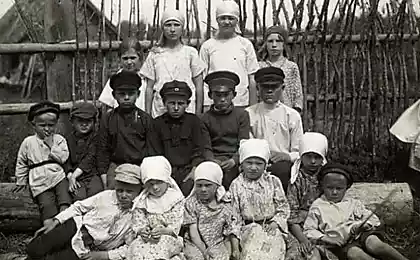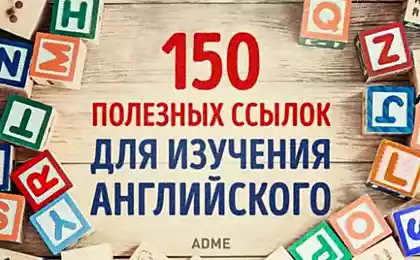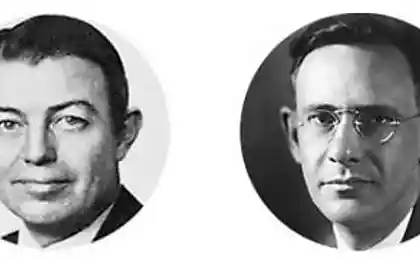813
The subtleties of the great and mighty Russian language. I do not envy the foreigners!
Russian is not only the great and mighty, and rightly incredible language. Have you ever wondered how often the same words mean entirely different things or express completely unlike emotions and feelings ... We are more or less easy, because we got used to their mother tongue and speak certain phrases, without thinking about their origin. But foreigners studying Russian, often have a hard time.
Just try to explain to them why the Russian language still it happened:

1. Why do we have a future, the present and the past, but still now we can express and the past (« Yesterday I was walking down the street ... i> »), and future (« Tomorrow I'm going to the movie i> »), and the elapsed time - order (« Quickly left here! i> »)?
2. In some languages acceptable double negative, in other - no; in the language of the double negation can express approval, but only in Russian double assertion « Well, yes, of course! i>» - expresses the denial or doubt in the words of the speaker.
3. Only here « Yeah» i> - synonymous with « please i>», « Thank you i>», « Hello i> »,« not at all i> »and« I'm sorry i> », a« let's i> »in most cases replaces« good-bye i > ».
4. It is very difficult to explain to foreigners that « very smart i>» - not always a compliment, « very smart i>» - mockery, and « too clever i>» - threat.
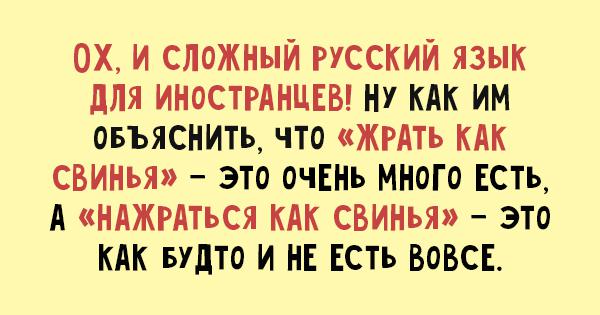
5. All foreigners studying Russian, wonder why « do i>» can mean not only a « do i>», and « OK i>», « good i> »,« great i> », and the« all right i> »and« it is not necessary to apologize i> ». < br />
6. The phrase « No, probably i>» - the cause stupor Russian students: in the same expression they see both the approval and denial, and self-doubt. And it represents a negation of uncertain possibilities with a touch of a positive decision.
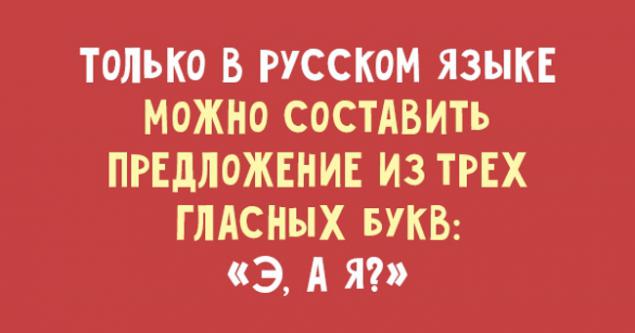
7. And how to explain to a foreigner phrase « hands do not reach to see i>»?
8. Try to correctly tell the difference between a « to drink tea i>» and « to drink tea i>», between « here i>», and "here." Why is action in the past can be put into words « before i>», « for a long time i>», « this morning i>», « recent i>» , « the other day i>» and a dozen others? Why, in certain situations they can replace each other?
9. How to pinpoint a particle with an inclination « could i>», when it expresses in different situations and conditions, and the request, and the desire and reverie, and the need for, and the assumption and the proposal, and regret? < br />
10. In the Russian language the same obscenities and insult possible, and admire, and to express all the other shades of emotion.

11. It happens that the verb do not have any form, and this is due to the laws of euphony. For example: « beat i>». He wins, you win ... I win? I will run? defeated? Philologists suggest the use of substitute construction « I'll win i>» or « will become the winner i>». Since the form of the first person singular of the verb have just missing.

12. A glass on the table is, and plug lays. If we plug the countertop, the plug will stand. That is, the items are vertical and horizontal lie? Adding to the table a plate and a pan. They're kind of like a horizontal, but are on the table. Now put the plate in the pan. There she is, and in fact was on the table. Maybe things are ready for use? No, the plug-it was ready when lying. Now the cat climbs on the table. She can stand, sit and lie down. If in terms of standing and lying she somehow creeps into the logic of « Vertical Horizontal i>», then the rest - this new property. She sits on the priest. Now on the table sat a bird. She sits on the table, but sitting on the legs, not the pope. Though like there should be. But it can not stand at all. However, if we kill the poor and make a stuffed bird, it will be on the table. It may seem that the seat - an attribute of the living, but boots on the leg sits too, although he did not live and does not have priests. So, go and understand Well, that is what is and what is sitting.
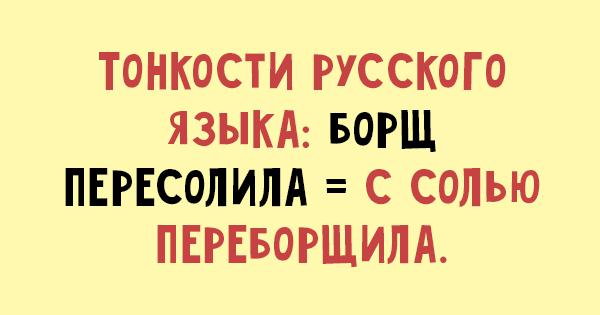
After reviewing all the details, now I understand why the Russian is considered one of the most difficult languages in the world. If you forced to smile these facts, then share them with friends. Maybe your comrades talk about the other intricacies of the great and mighty ...
via ofigenno ru
Just try to explain to them why the Russian language still it happened:

1. Why do we have a future, the present and the past, but still now we can express and the past (« Yesterday I was walking down the street ... i> »), and future (« Tomorrow I'm going to the movie i> »), and the elapsed time - order (« Quickly left here! i> »)?
2. In some languages acceptable double negative, in other - no; in the language of the double negation can express approval, but only in Russian double assertion « Well, yes, of course! i>» - expresses the denial or doubt in the words of the speaker.
3. Only here « Yeah» i> - synonymous with « please i>», « Thank you i>», « Hello i> »,« not at all i> »and« I'm sorry i> », a« let's i> »in most cases replaces« good-bye i > ».
4. It is very difficult to explain to foreigners that « very smart i>» - not always a compliment, « very smart i>» - mockery, and « too clever i>» - threat.

5. All foreigners studying Russian, wonder why « do i>» can mean not only a « do i>», and « OK i>», « good i> »,« great i> », and the« all right i> »and« it is not necessary to apologize i> ». < br />
6. The phrase « No, probably i>» - the cause stupor Russian students: in the same expression they see both the approval and denial, and self-doubt. And it represents a negation of uncertain possibilities with a touch of a positive decision.

7. And how to explain to a foreigner phrase « hands do not reach to see i>»?
8. Try to correctly tell the difference between a « to drink tea i>» and « to drink tea i>», between « here i>», and "here." Why is action in the past can be put into words « before i>», « for a long time i>», « this morning i>», « recent i>» , « the other day i>» and a dozen others? Why, in certain situations they can replace each other?
9. How to pinpoint a particle with an inclination « could i>», when it expresses in different situations and conditions, and the request, and the desire and reverie, and the need for, and the assumption and the proposal, and regret? < br />
10. In the Russian language the same obscenities and insult possible, and admire, and to express all the other shades of emotion.

11. It happens that the verb do not have any form, and this is due to the laws of euphony. For example: « beat i>». He wins, you win ... I win? I will run? defeated? Philologists suggest the use of substitute construction « I'll win i>» or « will become the winner i>». Since the form of the first person singular of the verb have just missing.

12. A glass on the table is, and plug lays. If we plug the countertop, the plug will stand. That is, the items are vertical and horizontal lie? Adding to the table a plate and a pan. They're kind of like a horizontal, but are on the table. Now put the plate in the pan. There she is, and in fact was on the table. Maybe things are ready for use? No, the plug-it was ready when lying. Now the cat climbs on the table. She can stand, sit and lie down. If in terms of standing and lying she somehow creeps into the logic of « Vertical Horizontal i>», then the rest - this new property. She sits on the priest. Now on the table sat a bird. She sits on the table, but sitting on the legs, not the pope. Though like there should be. But it can not stand at all. However, if we kill the poor and make a stuffed bird, it will be on the table. It may seem that the seat - an attribute of the living, but boots on the leg sits too, although he did not live and does not have priests. So, go and understand Well, that is what is and what is sitting.

After reviewing all the details, now I understand why the Russian is considered one of the most difficult languages in the world. If you forced to smile these facts, then share them with friends. Maybe your comrades talk about the other intricacies of the great and mighty ...
via ofigenno ru
23 incredible shot Terry Border. Creativity, which deserves your attention ...
7 best prisons in the world. Yes this is a real holiday camp!

